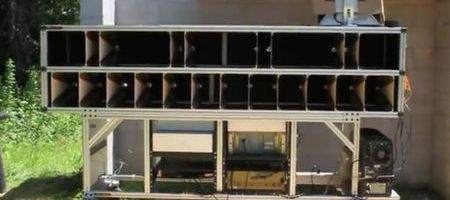MIT researchers have developed a new radar technology that gives real-time video of what’s going on behind solid walls from up to 60 feet away.

While existing through-wall systems have delivered images at a snail’s pace, the new device offers video at 10.8 frames per second.
“If you’re in a high-risk combat situation, you don’t want one image every 20 minutes, and you don’t want to have to stand right next to a potentially dangerous building,” says project leader Gregory Charvat.
The device consists of an array of antennas arranged into two rows — eight receiving elements on top, 13 transmitting ones below — and some computing equipment, all mounted onto a movable cart.
It uses S-band waves, which have about the same, fairly short, wavelength as wireless internet. That means more signal loss — creating a need for amplifiers — but means the actual radar device can be kept to about eight and a half feet long, and can thus be vehicle-mounted.
To eliminate signals from the wall itself, an analog crystal filter exploits frequency differences between the modulated waves bouncing off the wall and those coming from the target, enabling the wall to be simply filtered out.
Because the processor uses a subtraction method — comparing each new picture to the last, and seeing what’s changed — the radar can only detect moving targets, not inanimate objects such as furniture. But, says MIT, even a human trying to stand still moves slightly, and the system can detect these small movements.
The system digitizes the signals it receives into video. Currently, people show up as blobs that move about the screen in a bird’s-eye-view. The researchers are currently working on algorithms that will automatically convert a blob into a clean symbol to make the system more end-user friendly.
With a bit more work, the radar could be used by emergency-response teams and others, but the researchers say they developed the technology primarily for the military.
“This is meant for the urban war fighter… those situations where it’s very stressful and it’d be great to know what’s behind that wall,” says Charvat.






